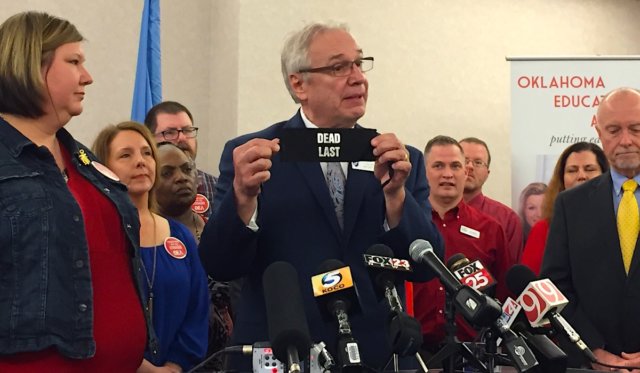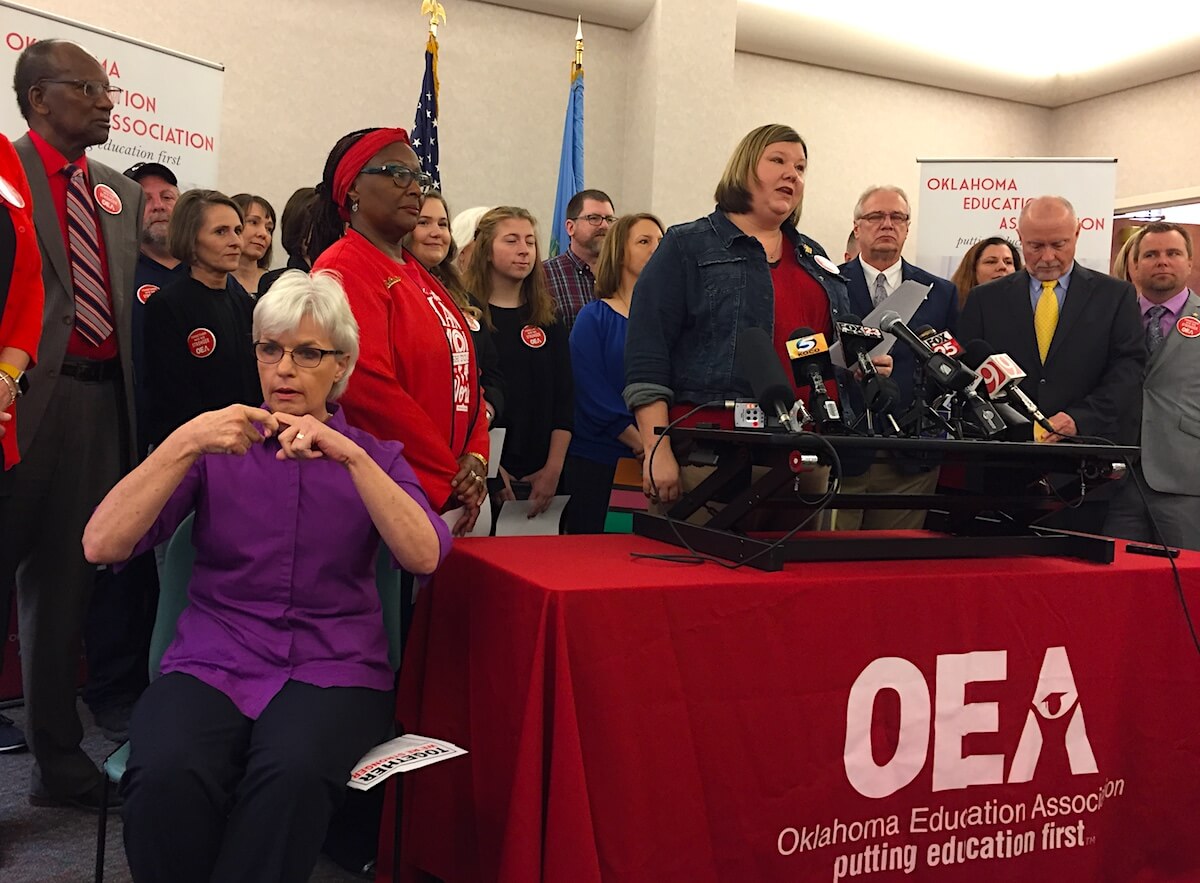

Leaders of the pending April 2 education walkout referenced parables from their parents as they pitched their own pay plan to raise more than $900 million in revenue this morning.
“As my dad used to tell me as a kid growing up, it’s time to put your big-boy britches on,” said Ed Allen, president of the Oklahoma City chapter of the American Federation of Teachers. “So it’s time for our legislators — both men and women — to put your big-boy and big-girl britches on.”
David DuVall, executive director of the Oklahoma Education Association, referenced how delayed the state’s action has been on education funding.
“My mother used to say to me, ‘Honey, you know when is the best time to plant a tree?'” he recalled. “Twenty years ago. The next best time is today.”
Today, DuVall’s organization released its own set of revenue measures that, if passed by lawmakers, would pave the way for the substantial raises and education funding increases the OEA has said are necessary for the future of the state’s schools.
The OEA proposal includes:
- Capping itemized, non-charitable deductions
- Eliminating the capital gains deduction
- Raising the gross production tax incentive rate from 2 percent to 5 percent
- Allowing ball and dice games in casinos
- Adding a $5-per-room tax on hotel stays
- Adjustments to alcohol taxes
- $0.06 increases to gas and diesel taxes
- Creating two-year car tags
- Changing rules on sales tax collection
- Adding a $1.50 cigarette tax and other tobacco taxes
- Creating a new tax on wind power generation
“In short, this plan asks everyone to play their part and pay their part to give Oklahoma students a brighter future and give all Oklahomans some hope that better days lie ahead,” DuVall said. “We all deserve better than the flawed plans that lawmakers have scrambled to reveal in the face of school closures and teacher walkouts.”
The components of the proposal include ideas pitched before by Republicans, Democrats and other advocacy coalitions over the past year.
“It’s about political will. Oklahomans are tired of the blame game,” DuVall said. “They’re tired of the House blaming the Senate, and they’re tired of the Senate blaming the House. They are tired of Democrats blaming Republicans and Republicans blaming Democrats.”
But asked to name specific legislators who have been impediments to passing a plan, OEA president Alicia Priest declined to name names. After the press conference, she added that the organization was not prepared to say it would oppose the re-election of any lawmakers — Republican or Democrat — who might vote against the union’s proposal.
“This is one way that we measure those who say they support public education,” Priest said before listing other factors that would be considered before endorsing or opposing incumbent lawmakers. “Did they support the first budget? Did they support the second budget proposal? Did they support other bills that we have supported through the year?”
Priest said 147 of the state’s 512 school districts have passed resolutions to support the April 2 walkout.

Schulz: ‘Both chambers are committed’
OEA’s plan announcement comes eight days after Oklahoma House Speaker Charles McCall joined a different teacher union — the Professional Oklahoma Educators — to pitch a plan called “60 in 6,” aimed at getting teacher pay for 25-year instructors to $60,000 annually six years from now. The plan was criticized by other educators for not including specifics about funding and not addressing general education funding issues immediately.
Late the night before, the Oklahoma State Senate attempted to pass a revenue bill — HB 1033XX — to fund a 12.7 percent teacher pay raise but fell two votes short. That bill was opposed by Senate Democrats who said it did not meet the goals identified by OEA.
“Frankly, that bill just initiated a shell game of money so the supporters could say they were doing a pay raise, but really at the expense of the rest of the education needs, as well as the general budget,” Senate Minority Leader John Sparks (D-Norman) said this Thursday.
Asked what items he and his caucus would support for a pay raise plan, Sparks avoided offering specifics.
“When those numbers add up to the amount required by education to adequately invest in their mission,” he said, adding that people are “missing the larger picture” if they think the Senate’s stalled proposal would have solved education problems.
Senate President Pro Tempore Mike Schulz (R-Altus) also spoke to media Thursday, saying ultimately it is unlikely the various plans pitched by different groups and lawmakers will form the solution.
“At the end of the day, it will be a leadership package in some form or fashion,” Schulz said. “I think both chambers are committed to getting this resolved sooner rather than later.”
Student: Oklahoma failing its coursework
The OEA announced its official intent for the school walkout March 8 at another press conference. At the time, the union called for $10,000 in teacher pay raises over three years, as well as raises for school staff and increases in general funding for education. Days later, the Oklahoma Public Employees Association voted to support the teacher walkout with their own actions and have demanded public employee raises, too.
Friday, educators were joined at their press conferences by two high school students: Chloe May, a senior from Bartlesville, and Hope Davis, a sophomore from Moore.
“Textbooks are decades outdated. Many schools have gone to four-day weeks just to make ends meet,” May said. “Our number of emergency-certified teachers has increased to nearly 2,000, and we are being forced to cut key classes out of our curriculum. If any teacher were to grade Oklahoma on its work right now, we would get an ‘F’.”
Davis, a hearing-impaired student, spoke about how her school district’s struggle to retain qualified teachers has affected her life.
“My teachers are emergency-certified subs,” Davis said, signing along to her remarks. “No student should learn like that.”
Davis said she has two emergency-certified teachers this semester, had one teacher quit and has enrolled in an online geometry class to improve her learning experience.
“We cannot and will not allow the Legislature to continue to shortchange our students,” Priest said. “The Legislature has one more week to pass the necessary bills.”
Following the OEA’s press conference, the anti-tax Oklahoma Council of Public Affairs released a statement from its president Jonathan Small, who criticized OEA’s pay plan.
“Some of the proposed tax increases — particularly the income tax hikes — would damage our state’s competitiveness for years to come,” Small said. “Others would fail to bring in the predicted revenues, guaranteeing future budget shortfalls. And taxpayers will notice that there is nothing in the plan about better using existing funds.”
Small referenced the OCPA’s own proposal.
“Anyone serious about giving teachers a raise is looking first at money the state and local districts already have, whether it is at the Commissioners of the Land Office, in the Building Fund, or being wasted in giveaways to filmmakers or TSET pet projects,” he said. “From there, OCPA’s ‘Plan That Can Pass’ sketches out a way to raise revenue without doing long-term damage to our state’s economy.”
House Democratic Minority Leader Steve Kouplen (D-Beggs) released a statement as well to “applaud” the OEA’s pay plan.
“We realize this fight is as much about respect as it is revenue, and we stand with teachers in this effort. The revenue package outlined today is a step in the right direction,” Kouplen said. “Our hope is that we can use this roadmap to work with Republicans in the House and build a budget that restores Oklahoma’s commitment to education, rural health care, state employees and core state services.”
(Editor’s note: This post was updated at 12:02 p.m. Friday, March 23, 2018, to include Kouplen’s quote. The OEA is currently advertising on NonDoc.)




















